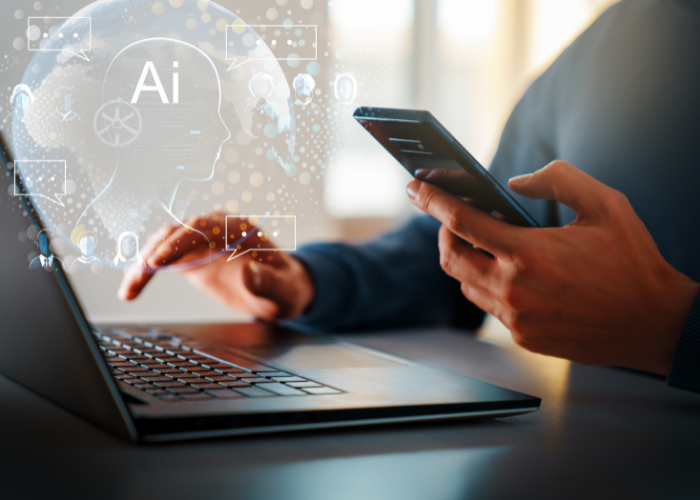
06.19.23
FineView Marketing can analyze your consumer data creating highly targeted marketing campaigns. This helps you to effectively engage with your target audience.
Algorithms are the backbone of AI-powered marketing strategies. They are complex mathematical formulas that analyze large volumes of data to make predictions and recommendations. Put more simply, algorithms are procedures for solving problems.
Traditional marketing methods typically rely on manual analysis, which is time-consuming and prone to human error.
AI algorithms, on the other hand, can analyze millions of data points within seconds. This real-time analysis allows businesses to make data-driven decisions that will optimize their marketing efforts and maximize ROI.
Now that you understand algorithms, let’s take a closer look at some of the ways AI is used in marketing.
In the ever-evolving landscape of digital marketing, you will see one technology that continues to make waves: artificial intelligence (AI). From algorithms that optimize content to chatbots that engage with customers, AI is revolutionizing the way businesses approach marketing strategies. AI-driven marketing is set to drive 45% of the total global economy by 2032.
But what exactly is the role of AI in marketing?
Artificial intelligence provides your business with the ability to analyze large amounts of data quickly and accurately. AI can inform marketing strategies and improve targeting efforts by identifying patterns in consumer behavior.
However, one of the most significant benefits of AI in marketing is its ability to personalize the customer experience.

Consumer behavior analysis provides insights into why your customers make buying decisions and how they interact with your brand. Traditional consumer behavior analysis involves surveys, focus groups, and manual data interpretation.
However, with AI, marketers now have access to sophisticated tools that can analyze massive amounts of data to understand consumer behavior on a deeper level.
In addition to analyzing consumer behavior, AI-powered tools can also predict future behavior.
For example, AI algorithms can identify customers who are likely to churn. This allows marketers to implement targeted retention strategies. By predicting customer behavior, you can take proactive measures to retain customers, increase loyalty, and ultimately drive revenue growth.
When social media marketing is powered by AI, social listening moves to a whole new level.
AI-powered algorithms can analyze social media interactions to uncover patterns and trends in consumer behavior. By processing this information, AI algorithms can identify preferences, motivations, and pain points that influence buying decisions. This knowledge allows marketers to tailor their messaging to resonate with your target audience.
With social media sentiment analysis, AI can cut through the noise. You can gain a deep understanding of your customers’mind and anticipate their next move.
This level of understanding enables businesses to build stronger relationships with their customers. As a result, you can deliver personalized experiences that meet client needs and expectations.
Content creation is essential for engaging your customers and providing value. AI-powered tools are changing the way businesses approach content creation. It gives you a tool to produce high-quality content that delivers personalized experiences to your audience.
It works like this. AI algorithms can generate content using natural language processing techniques. These algorithms can analyze blog posts, articles, and social media posts, to understand language patterns. This knowledge allows AI algorithms to generate human-like content that is relevant and engaging.
For example, AI algorithms can generate product descriptions, blog posts, and even news articles based on specific topics or keywords. This level of automation enables you to produce more content, freeing up valuable time and resources for other marketing activities.
If you’ve ever used a chat platform when you’re trying to make a purchase on your favorite website, you’ve used a chatbot. This is an AI-powered tool that can imitate human conversation and interact with customers in real time. It can answer frequently asked questions, provide product recommendations, and assist with purchases.
Chatbots leverage natural language processing and machine learning algorithms to understand your questions and provide relevant responses. By using chatbots, businesses can provide instant support. This leads to improved response times, and an enhanced overall customer experience.
Most people are familiar with Amazon’s Alexa and Apple’s Siri. These are your virtual assistants. They can perform tasks and provide information based on voice commands or text input.
For example, their functions include everything from setting reminders to providing weather updates. By leveraging virtual assistants, businesses can offer personalized assistance to their customers. This makes it easier for them to interact with the brand and access relevant information.
The only constant in life is change, and the marketing industry is going through a tremendous change right now. AI is transforming the traditional marketing landscape and is playing a significant role when it comes to informing marketing strategies. Regardless of what you think of AI, no one can dispute that it’s here to stay.